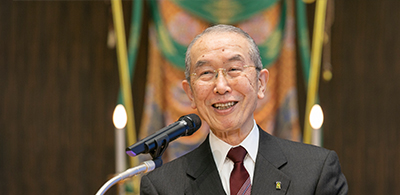Saving Money and Spending Money—Donation, Part 2
February 2022

Donation Is a Manifestation of the Mind of Compassion
I think that as the Ceremony for the Anniversary of Shakyamuni’s Entering Nirvana (February 15) approaches and we reflect upon Shakyamuni’s virtues, many people are learning something new. In that sense, when I reread the historical account of the Buddha, I am struck by Shakyamuni’s words to his disciples, foretelling his nirvana. When he entrusted them with practicing the teaching and disseminating the Dharma, he did so “in order to benefit many people, bring happiness to many people, and show compassion to the people of this world.” These words express his earnest wish for the happiness of everyone.
For Shakyamuni, who dedicated his life to benefitting other people, disseminating the Dharma after having attained awakening was nothing other than the practice of donation. In other words, through this donation, Shakyamuni devoted himself to compassion. His example also teaches us that one’s mind of consideration and kindness takes a concrete form in social interactions only when it is actually put into practice through donation (teaching, material goods, or physical abilities). Therefore, donation is one and the same as the practice of compassion.
That said, society at large still has the strong impression that “donation” means giving money to temples or religious organizations and I feel that this idea of donation, as something financial or material, is a misunderstanding of its original meaning.
Is Accumulating Wealth Also a Buddhist Practice?
Buddhism’s view of wealth, according to the Buddhist scholar Hajime Nakamura (1912–99), is to “explain to ordinary lay practitioners that this-worldly wealth should be respected and viewed positively, [because] the accumulation of wealth is considered one of life’s desirable purposes.” Even in the seemingly austere world of Buddhism, seeking a profit and saving money are not deemed activities to refrain from, but rather part of a positive way of life that can lead to a sense of purpose. The reason, according to Nakamura, is that “we save money because we aim to share it with other people and thereby contribute to their happiness and well-being.”
People say that whether or not money is put to good use depends entirely on the intention of the person spending it. Money is sometimes used for bad purposes and therefore, how we spend is important. Buddhism praises people who become wealthy and give to many people, underscoring the importance of letting go of the stingy mind in order to share with others. No matter how much wealth you accumulate or money you save, “if you keep it all for yourself, it is rotting away. But by spreading it around, your money is put to good use,” which Professor Nakamura says is the original meaning of “donation.”
The Japanese word keizai (economy) comes from a classical Chinese phrase meaning, “to govern the nation by providing relief to the people,” so it could be that the basis of the economy is sharing accumulated wealth with impoverished and suffering people. Of course, it goes without saying that those savings have been properly and legally earned.
In the midst of the present reality, as all lives around the world are threatened by crises such as climate change imperiling the global environment, food security, and wealth disparity, we must find a way of life that rethinks human activity.
Well-known international economists are saying that from now on, when considering the world order and the future of humanity, the principle of benefitting others is key. In other words, it is essential that the spirit of benefitting, and sharing with, others takes root in everyone’s minds and that government and business work together to benefit others for the purpose of building a bright future. This way of thinking harmonizes with the Buddha’s voice urging us to “awaken to the teaching that ‘oneself and others are one and the same,’ which means all things are fundamentally one and, with the mind of donation, share what you have.”
In that sense as well, donation could even be called one of our most important forms of diligence. Indeed, donating (sharing) the teachings of the Buddha is fundamental to our being bodhisattvas, but so too is practicing compassion—showing consideration for the feelings of those in the midst of pain and suffering—by donating using) our physical and mental abilities to give them peace of mind.
However, regarding monetary donations, it is necessary to carefully consider matters such as what the receiving organization does with them. What does it mean for those monetary donations to be truly utilized so that they bring merits to both oneself and others?
I wonder what all of you think about this.



